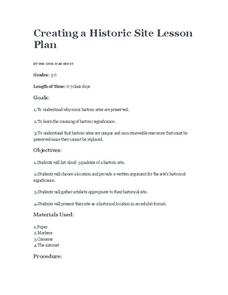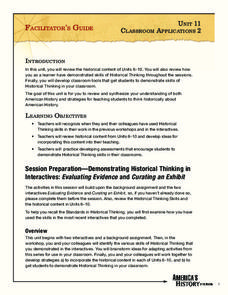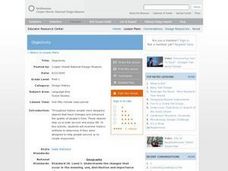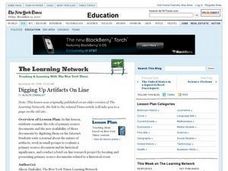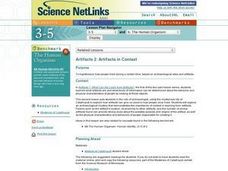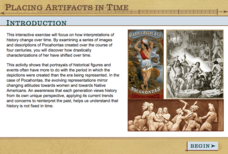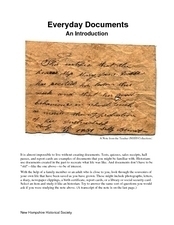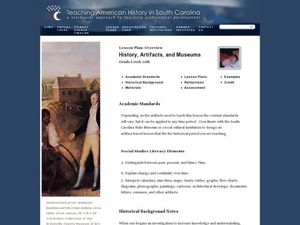DocsTeach
Evaluating a Needlework Sampler as Historical Evidence
Needlework isn't just for home decor; it can also help record family history. Academics analyze a needlework sampler to understand how they were used to record marriages and births. The activity includes a series of written questions,...
Annenberg Foundation
Analyzing Artifacts
If only a mask could talk! Using the interactive tool along with historical thinking skills, pupils uncover the meaning behind the various materials the resource presents. History becomes more relevant as the artifacts tell their stories...
University of Chicago
Using Artifacts for Clues About Identity
Learn about the ancient Near East through a close examination of ancient artifacts. Lead your class into analysis by first observing an artifact as a class. Pupils can then work in pairs to analyze the other artifacts and compile a list...
Civil War Trust
Creating a Historic Site
A historic site marks a place where a relevant historical event occurred, no matter how many people know about it. Small groups choose their own historical sites, including a place where a class member was born, or even a...
Annenberg Foundation
America's History in the Making: Classroom Applications Two
Reading between the lines helps discover important information! The 11th lesson of a 22-part series on American history has scholars use historical thinking skills to uncover the deeper meaning behind the words on a page. Using backward...
PBS
Family History: Treasure Troves
It's time for show and tell! Scholars investigate historical artifacts to determine what secrets they reveal about the time periods they represent. They then research their own personal artifacts, as well as those from World War I.
BrainPOP
Famous Historical Figures Lesson Plan: Who Am I?
History detectives select a famous person to research, fill a bag with items associated with their subject, then ask class members to guess the historical figure represented by the artifacts.
Curated OER
Objectivity
Help young readers examine historic artifacts to determine if they were designed to help people survive or to create enjoyment. They identify objects that were designed to help people to survive and to enjoy themselves. Then compare and...
Museum of Tolerance
Artifact Research Activity
Artifacts give us the privilege of learning about the past, may it be family, culture, or traditions. Here, class members learn about their family's past with the help of an artifact, or family heirloom. Once an artifact is...
Curated OER
Primary Sources and Personal Artifacts
Connect historical text to primary sources. Researchers observe and discuss primary sources. Then, historians bring in their own personal artifacts and connect them back to their history.
Museum of the American Revolution
Historical Analysis: Objects Tell Stories
Dig this! Young archeologists discover what objects teach us about the past. The activity uses an image of a Revolutionary War artifact to help historians practice analyzing the past. Scholars study the object and complete a worksheet to...
Pennsylvania Department of Transportation
King of Prussia Inn: Exploring Historic Places
Learners of any age examine the significance of historic sites, how we understand those sites, and what they mean in terms of history and the culture of the past. They look at maps, artifacts, and data taken from archaeological sites to...
Curated OER
Digging Up Artifacts On Line
Why is it important to preserve historical documents and artifacts? Examine the role of primary source documents and the availability of these documents on the Internet. Middle and high schoolers write a journal about the nature of...
Curated OER
Artifacts 2: Artifacts in Context
Students explore world history by completing artifact worksheets. In this archaeology lesson, students identify the importance of finding clues when researching historical information by utilizing artifacts. Students research the...
Annenberg Foundation
Placing Artifacts in Time
Can history distort the true story behind famous people? Scholars analyze the many faces of the Native American Pocahontas. Incorporating technology and historical thinking skills, they uncover the many different sides to the Pocahontas...
Calisphere
The 6 C's of Primary Source Analysis
Arm your class members with the six C's of primary source analysis—content, citation, context, connections, communication, and conclusions—and help them to establish a solid system for analyzing historical sources of...
Curated OER
Creating Historians Part Two: The Grab Bag
You don't need to be a museum curator to bring artifacts into the classroom; part two of a series on approaching social studies as a group of historians.
Curated OER
Everyday Documents
Almost more of a lesson than a worksheet, this particular resource has learners examine different types of historical documents. There is a historical docment embedded in the worksheet that learners study, and they also bring in...
TCI
Picking Rusty Gold: Why Do People Buy and Sell Antiques?
Your historical sleuths will work to research the in-depth history of chosen artifacts and will use their research to design a fictional advertisement for an early 20th century item.
National Park Service
The Power of Remembrance
On every July 4th, we watch fireworks and celebrate our independence, but how is the history of the American Revolution preserved? Four social studies lesson guide learners through different memorials, commemorative objects, and restored...
Newseum
Media Mix-Ups Through History: Analyzing Historical Sources
Scholars use the E.S.C.A.P.E. (Evidence Source, Context, Audience, Purpose, Execution) strategy to analyze a historical source to determine why mistakes happen in news stories. They then apply the same strategies to contemporary flawed...
Curated OER
What Do We Learn From the Repartiation of Alaska Native Artifacts?
Students observe and evaluate evidence of Alaska Native cultural symbols and artifacts. They research historical data from a variety of primary resources, including the Harriman expedition journals, related web sites, oral accounts,...
Curated OER
History, Artifacts, and Museums
Eleventh graders interpret historical evidence presented in primary and secondary resources. In this historical artifacts lesson, 11th graders select and research historical topics that require them to interpret calendars, timelines,...
PBS
1000 Words
A picture really can speak a thousand words—no matter how old! Scholars become history detectives as they learn how to analyze historical photos and evidence to uncover the past. The fun hands-on activity makes history come alive through...





